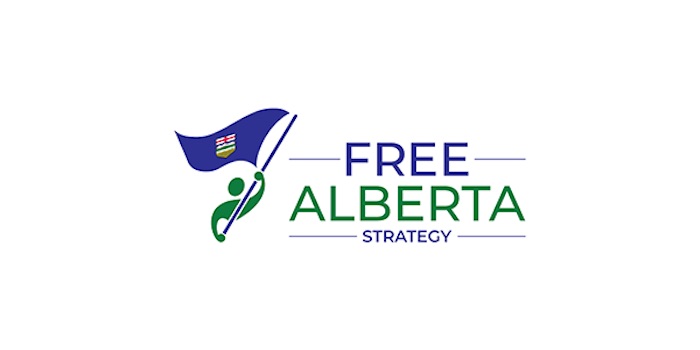Alberta
Writer opposing Free Alberta Strategy in national article confuses chartered banks with financial institutions

From the Free Alberta Strategy Team
In a new article published in the federal-government-funded “The Conversation” publication, Robert L. Ascah, a researcher at the also-federal-government-funded Parkland Institute, attempts to lay the hatchet to the Free Alberta Strategy.
In his piece, entitled “What the Free Alberta Strategy gets wrong about Canada’s banking system,” Mr. Ascah argues that the Alberta Independent Banking Act that is proposed in the Free Alberta Strategy report is unconstitutional because banking is an entirely federal area of jurisdiction.
Here is the key quote from Mr. Ascah:
“The Free Alberta Strategy, however, purports to allow Alberta to incorporate and regulate banks, which is clearly unconstitutional. There’s no mention that this proposal is beyond the powers of the provincial legislature.”
But, as so often seems to happen, this latest Free Alberta Strategy critic clearly doesn’t appear to have read – or taken the time to understand – what the Free Alberta Strategy is actually proposing.
While it’s true that “chartered banks” are federally regulated, that doesn’t mean that any type or form of “banking”, as the term is colloquially used, must be federally regulated.
Credit unions, for example, offer “banking” services, while not being “chartered banks” that are federally regulated.
This definition, while technical, is the crux of the issue.
And while we admit that this is very technical, when you’re talking about writing laws, technicalities matter a lot.
To be clear, here is the exact proposal from the Free Alberta Strategy report itself:
1. Expanding the number of provincially regulated financial institutions and credit unions;
2. Promoting private ownership of these new financial institutions; and
3. Mandating that all provincially regulated financial institutions and credit unions (including ATB) remain compliant with the Alberta Sovereignty Act as it relates to the non-enforcement of federal laws and court decisions deemed to infringe unduly on Alberta’s provincial jurisdiction.
You will note, very clearly, that this proposal in our Free Alberta Strategy report talks about “provincially regulated financial institutions” not “chartered banks”.
This is because the authors of the strategy understand (unlike Mr. Ascah, apparently) that while “chartered banks” must be regulated by the federal government, “financial institutions” can be regulated by the provincial government.
This is exactly why our Free Alberta Strategy report suggests modelling any new “banks” in Alberta on ATB Financial (previously known as Alberta Treasury Branches), which is a long-standing Alberta financial institution.
(Note: Although ATB is a crown corporation, our proposal envisages privately owned and operated financial institutions, not more government-owned and operated financial institutions. Just in case anyone was worried we were suddenly advocating for bigger government!)
Just as Alberta’s credit unions are not “chartered banks” and so are not federally regulated, ATB Financial is not a “chartered bank”, and so it is not regulated by the federal government.
ATB Financial is a “financial institution” that is provincially regulated by the Alberta government under the ATB Financial Act.
This is precisely what the Free Alberta Strategy report proposes – an increase in the number of provincially regulated financial institutions in Alberta.
We can clearly see then that, despite the claim by Mr. Ascah that provincial regulation of banking is unconstitutional, the mere existence of ATB is proof that our proposal is, in fact, constitutional.
The remainder of Mr. Ascah’s article goes on to argue that if Alberta unconstitutionally incorporated its own new “chartered banks”, the federal government would cut those banks off from being able to transfer funds to other banks in Canada, making them impractical for the public to use.
Maybe it’s true that the federal government would cut off any unauthorized provincial “chartered banks” from payment mechanisms.
But, given no one is proposing Alberta incorporate its own new “chartered banks”, this entire second half of the article is an irrelevant straw man argument.
Again, the Free Alberta Strategy proposes to incorporate new provincially regulated financial institutions, like ATB.
And, in case you haven’t noticed, ATB has not been cut off from being able to transfer funds to other banks by the federal government, because – shock – the existence of ATB is perfectly constitutional.
The real question then, is whether or not the first half of Mr. Ascah’s article, where he claims we are proposing to do something unconstitutional, is simply a misunderstanding, or a deliberately misleading diatribe.
Either way, such a fundamental error really makes you wonder why the Parkland Institute would allow the article to be published at all!
Are Parkland Institute staff no longer expected to read the thing they are publicly criticizing anymore?
Are The Conversation editors no longer expected to check whether their authors have their facts straight?
Perhaps the oddest part of this whole situation is that the Parkland Institute, where Mr. Ascah works, has previously written about the benefits of having an Alberta-based, Alberta-regulated financial institution!
They did so in a report that goes into detail explaining the difference between federally regulated chartered banks and provincially regulated financial institutions!
Even stranger still – which Parkland Institute researcher do you think it was who wrote this report?
Yes, you guessed it, it was Robert L. Ascah!
It gets worse…
Once upon a time, Mr. Ascah worked at Alberta Treasury, the government department that is responsible for regulating ATB.
Then, after he worked at Alberta Treasury, Mr. Ascah went to work at ATB itself, where he was responsible for government relations, strategic planning, and economic research.
That’s right folks…
Our Free Alberta Strategy critic, who attacked us by claiming that provincially regulated financial institutions are unconstitutional, actually worked as a senior executive at both the organization he claims is unconstitutional, and the organization that is supposed to regulate the thing that he claims is unconstitutional.
We must either believe, then:
- That Mr. Ascah, who has written about the benefits of provincially-regulated financial institutions, has worked for a provincially-regulated financial institution, and has worked for the organization that regulates provincially-regulated financial institutions, is somehow entirely unaware that provincially-regulated financial institutions are legal.
Or, we must believe:
- That Mr. Ascah perfectly understands that provincially-regulated financial institutions are legal and that that is how ATB is established, but that it’s somehow, all of a sudden, now beneficial for him to pretend that he doesn’t, and that anyone suggesting other financial institutions be regulated in that way is suggesting something “unconstitutional”.
How could it possibly be beneficial for Mr. Ascah to pretend that this idea is unconstitutional all of a sudden, I hear you ask?
Well, the answer to that question is actually the least confusing part of his article.
Contained right at the bottom of the article, under “Disclosure statement” (and conveniently excluded from most re-publications of the piece by the media) are 9 little words:
“Robert (Bob) L. Ascah is affiliated with Alberta NDP.”
Of course, affiliated with is a little bit of an understatement in this case.
Mr. Ascah has donated thousands of dollars to the Alberta NDP for many years, while several of his Parkland Institute colleagues are actually running as Alberta NDP candidates in the 2023 Alberta election!
Now, as a non-partisan organization, we generally try to avoid pointing out the political affiliations of individual people.
As an organization, we base our support for ideas on whether the ideas are good or not, rather than on who is proposing them.
But, in this case, we’re not criticizing the person proposing the ideas, but the lack of independence and the conflict of interest inherent in a situation where federal-government-funded researchers are published by federal-government-funded websites and re-printed by federal-government-funded newspapers.
Unfortunately, in a world where government-funded academics get government funding to write government propaganda published in government-funded media, there’s really no incentive to cover the truth anymore.
As to why the federal government would want to fund researchers to write propaganda for them, and fund media outlets to publish it for them, we’ll leave that one to you to answer!
In the end, this is exactly why we need more independent research and independent distribution of ideas in our society.
The Free Alberta Strategy jealously guards our independence.
That’s why we never accept any money or resources from any government, regardless of political stripe.
But that’s also why we need your help.
We need your help so that we can continue to do research and analysis on ways in which Alberta can fight back, such as the Sovereignty Act.
We need your help to further our work to protect Alberta’s interests from a hostile and divisive federal government in Ottawa.
We need your help to grow our supporter, activist, and volunteer network across our great province.
We need your help to share our work with like-minded friends and family in order to get the word out to as many members of the public as possible.
If you’re ready to help, click here:
Alberta
Central Alberta MP resigns to give Conservative leader Pierre Poilievre a chance to regain a seat in Parliament

From LifeSiteNews
Conservative MP Damien Kurek stepped aside in the Battle River-Crowfoot riding to allow Pierre Poilievre to enter a by-election in his native Alberta.
Conservative MP Damien Kurek officially resigned as an MP in the Alberta federal riding of Battle River-Crowfoot in a move that will allow Conservative Party of Canada leader Pierre Poilievre to run in a by-election in that riding to reclaim his seat in Parliament.
June 17 was Kurek’s last day as an MP after he notified the House Speaker of his resignation.
“I will continue to work with our incredible local team to do everything I can to remain the strong voice for you as I support Pierre in this process and then run again here in Battle River-Crowfoot in the next general election,” he said in a statement to media.
“Pierre Poilievre is a man of principle, character, and is the hardest working MP I have ever met,” he added. “His energy, passion, and drive will have a huge benefit in East Central Alberta.”
Kurek won his riding in the April 28 election, defeating the Liberals by 46,020 votes with 81.8 percent of the votes, a huge number.
Poilievre had lost his Ottawa seat to his Liberal rival, a seat that he held for decades, that many saw as putting his role as leader of the party in jeopardy. He stayed on as leader of the Conservative Party.
Poilievre is originally from Calgary, Alberta, so should he win the by-election, it would be a homecoming of sorts.
It is now up to Prime Minister of Canada Mark Carney to call a by-election in the riding.
Carney had promised that he would “trigger” a by-election at once, saying there would be “no games” trying to prohibit Poilievre from running and win a seat in a safe Conservative riding.
Despite Kurek’s old seat being considered a “safe” seat, a group called the “Longest Ballot Committee” is looking to run hundreds of protest candidates against Poilievre in the by-election in the Alberta Battle River–Crowfoot riding, just like they did in his former Ottawa-area Carleton riding in April’s election.
Alberta
Alberta pro-life group says health officials admit many babies are left to die after failed abortions

From LifeSiteNews
Alberta’s abortion policy allows babies to be killed with an ‘induced cardiac arrest’ before a late-term abortion and left to die without medical care if they survive.
A Canadian provincial pro-life advocacy group says health officials have admitted that many babies in the province of Alberta are indeed born alive after abortions and then left to die, and because of this are they are calling upon the province’s health minister to put an end to the practice.
Official data from the Canadian Institute for Health Information (CIHI), which is the federal agency in charge of reporting the nation’s health data, shows that in Alberta in 2023-2024, there were 133 late-term abortions. Of these, 28 babies were born alive after the abortion and left to die.
As noted by Prolife Alberta’s President Murray Ruhl in a recent email, this means the reality in the province is that “some of these babies are born alive… and left to die.”
“Babies born alive after failed late-term abortions are quietly abandoned—left without medical help, comfort, or even a chance to survive,” noted Ruhl.
This fact was brought to light in a recent opinion piece published in the Western Standard by Richard Dur, who serves as the executive director of Prolife Alberta.
Ruhl observed that Dur’s opinion piece has “got the attention of both Alberta Health Services (AHS) and Acute Care Alberta (ACA),” whom he said “confirmed many of the practices we exposed.”
Alberta’s policy when it comes to an abortion committed on a baby older than 21 weeks allows that all babies are killed before being born, however this does not always happen.
“In some circumstances… the patient and health practitioner may consider the option of induced fetal cardiac arrest prior to initiating the termination procedures,” notes Alberta Health Services’ Termination of Pregnancy, PS-92 (PS-92, Section 6.4).
Ruhl noted that, in Alberta, before an “abortion begins, they stop the baby’s heart. On purpose. Why? Because they don’t want a live birth. But sometimes—the child survives. And what then?”
When it comes to the same policy for babies older that 21 weeks, the policy states, “For terminations after 21 weeks and zero (0) days there must be careful consideration and documentation concerning a Do Not Resuscitate order in anticipation of a possible live birth.” (PS-92, Section 6.4).”
Ruhl observed that the reality is, “They plan in advance not to save her—even if she’s born alive.”
If the baby is born alive, the policy states, “Comfort measures and palliative care should be provided.” (PS-92, Section 6.4).
This means, however, that there is no oxygen given, no NICU, “no medical care,” noted Ruhl.
“Their policies call this ‘palliative care.’ We call it what it is: abandonment. Newborns deserve care—not a death sentence,” he noted.
As reported by LifeSiteNews recently, a total of 150 babies were born after botched abortions in 2023-2024 in Canada. However, it’s not known how many survived.
Only two federal parties in Canada, the People’s Party of Canada, and the Christian Heritage Party, have openly called for a ban on late abortions in the nation.
Policy now under ‘revision’ says Alberta Health Services
Ruhl said that the province’s policies are now “under revision,” according to AHS.
Because of this, Ruhl noted that now is the time to act and let the province’s Health Minister, Adriana LaGrange, who happens to be pro-life, act and “demand” from her real “action to protect babies born alive after failed abortions.”
The group is asking the province to do as follows below:
- Amend the AHS Termination of Pregnancy policy to require resuscitative care for any baby born with signs of life, regardless of how the birth occurred.
- Require that these newborns receive the same level of care as any other premature baby. Newborns deserve care—not a death sentence.
- Recognize that these babies have a future—there is a literal waiting list of hundreds of families ready to adopt them. There is a home for every one of them.
While many in the cabinet and caucus of Alberta Premier Danielle Smith’s United Conservative government are pro-life, she has still been relatively soft on social issues of importance to conservatives, such as abortion.
-

 Health2 days ago
Health2 days agoLast day and last chance to win this dream home! Support the 2025 Red Deer Hospital Lottery before midnight!
-

 conflict2 days ago
conflict2 days ago“Evacuate”: Netanyahu Warns Tehran as Israel Expands Strikes on Iran’s Military Command
-

 Aristotle Foundation2 days ago
Aristotle Foundation2 days agoThe Canadian Medical Association’s inexplicable stance on pediatric gender medicine
-

 Energy2 days ago
Energy2 days agoCould the G7 Summit in Alberta be a historic moment for Canadian energy?
-

 Bruce Dowbiggin2 days ago
Bruce Dowbiggin2 days agoWOKE NBA Stars Seems Natural For CDN Advertisers. Why Won’t They Bite?
-

 Crime2 days ago
Crime2 days agoMinnesota shooter arrested after 48-hour manhunt
-

 Alberta2 days ago
Alberta2 days agoAlberta announces citizens will have to pay for their COVID shots
-

 Uncategorized2 days ago
Uncategorized2 days agoKananaskis G7 meeting the right setting for U.S. and Canada to reassert energy ties





